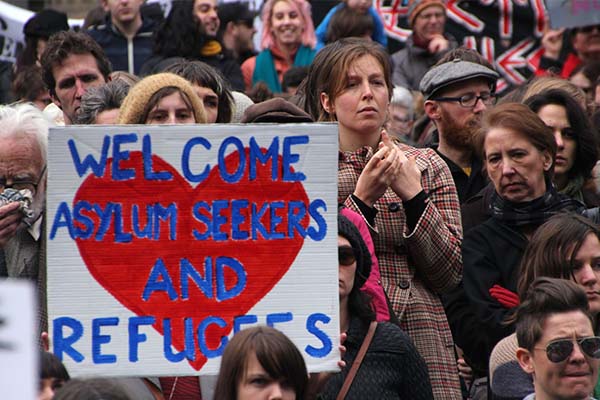On the margins of the consultations for the Global Compact for safe, orderly and regular migration, and in collaboration with the Quaker United Nations Office and the Governments of Portugal, El Salvador, Canada, Switzerland and Mexico, the Office of the High Commissioner for Human Rights (OHCHR) held a side-event today to discuss practical and effective ways of protecting the human rights of migrants in vulnerable situations.
Along with other civil society experts, the Director of ISHR, Phil Lynch, was invited as a panelist and raised several key points about the obligation for States to respect, protect and facilitate the vital work of migrant rights defenders.
‘In its resolution 29/2, the Human Rights Council explicitly acknowledged the role of individuals and institutions who provide humanitarian support and defend the rights of migrants’, said Mr Lynch. The resolution calls upon States to ensure that ‘domestic law and administrative provisions and their application facilitate the work of all actors providing humanitarian assistance to and defending the human rights of irregular migrants, including by avoiding any criminalisation, stigmatisation, impediments, obstructions or restrictions thereof contrary to international human rights law’.
This call was endorsed by a number of States during the Council’s recent Enhanced Dialogue on Migrants. Germany, for example, noted the crucial role of human rights defenders in protecting vulnerable migrants, while Belgium emphasised the need for a safe and enabling environment for organisations providing assistance to migrants.
‘The obligation of States in this area is also increasingly being taken up by treaty bodies’, Mr Lynch continued. In its review of Mexico, the Committee on Migrant Workers recommended ‘the adoption of concrete and adequate measures to guarantee the life, liberty, and integrity of defenders of the human rights of migrant workers and members of their families, to ensure that they are not subjected to prosecution, harassment, detention or investigation based solely on their advocacy of respect for migrant workers’ rights’. The Committee also urged Mexico ‘to adopt effective measures to prevent, investigate and punish attacks and other forms of abuse perpetrated against defenders of migrant workers rights.’
More recently, in its review of Turkey in 2016, the Committee reminded ‘the State party that human rights defenders deserve special protection as their work is critical for promoting human rights for all, including migrant workers.’
Restrictions on work of migrant rights defenders
Despite these important pronouncements on international law and standards, an increasing number of States are imposing legal or other restrictions on the work of migrant rights defenders, and contributing to rather than alleviating an environment of vulnerability.
‘This is reflected in the end of mission statements of the UN Special Rapporteur on Human Rights Defenders, Michel Forst, in three of his last four country missions’, Mr Lynch said.
Following his visit to Hungary, the Special Rapporteur raised concerns about government failures to protect migrants and defenders from far-right and extremist threats. He also denounced the use of excessive force against migrants during a demonstration, and against journalists seeking to monitor that demonstration.
In Mexico, the Special Rapporteur expressed grave concern that the efforts of organisations and defenders to provide assistance to migrants in transit were under threat from criminal actors who, in his words, extort, rape and kill, often with full impunity.
Finally, following his 2016 country mission to Australia, the Special Rapporteur expressed concern at what he called ‘vilification’, ‘stigmatisation’ and ‘retaliation’ against refugee rights defenders. ‘Lawyers and human rights advocates who assist refugees and asylum seekers in immigration detention in Australia face many barriers,’ Mr Forst said. This issue was also taken up by the Special Rapporteur on Migrants, François Crepeau who, following his November 2016 mission to Australia, expressed concern that ‘Civil society organisations, whistleblowers, trade unionists, teachers, social workers and lawyers, among many others, may face criminal charges under the Border Force Act for speaking out and denouncing the violation of the rights of migrants.’
In addition to legal restrictions such as these, migrant rights defenders face a range of practical restrictions to their work.
OHCHR, for example, has reported that human rights lawyers and civil society groups were denied access to their clients during the dismantling of the ‘Jungle’, a migrant settlement in Calais, France.
Civil society groups in Serbia have expressed similar concerns. There, organisations such as the Belgrade Centre for Human Rights have been restricted in their access to unaccompanied minors.
The way forward
In the context of these regressive developments, the High Commissioner’s draft ‘Principles and practical guidance on the protection of the human rights of migrants in vulnerable situations’ (A/HRC/34/31) take on a particular importance.
ISHR welcomes and endorses this initiative and, in particular, draft Principle 18 which calls on States to ‘Respect and support the activities of human rights defenders and others working to rescue and provide assistance to migrants’. This requires that States:
- facilitate and not criminalise or otherwise restrict the work of migrants rights defenders
- publicly promote the work of those supporting migrants
- ensure specific protection to defenders who are migrants
- investigate and ensure accountability where migrant rights defenders face violence, discrimination, intimidation or reprisals.
This draft Principle deserves the full support and implementation of all States. It is required by international law and it is in our individual and collective interests.




